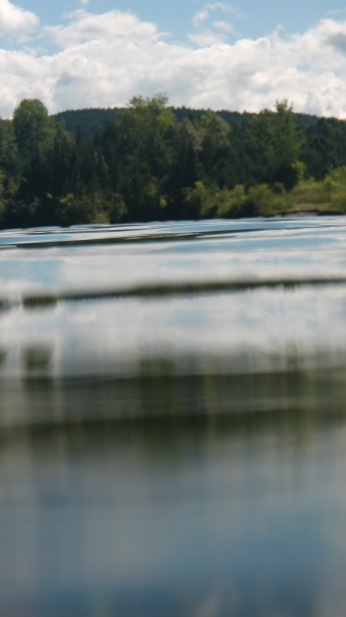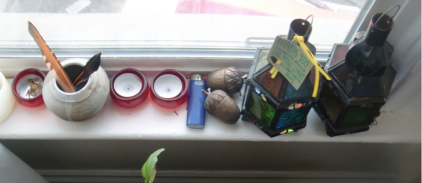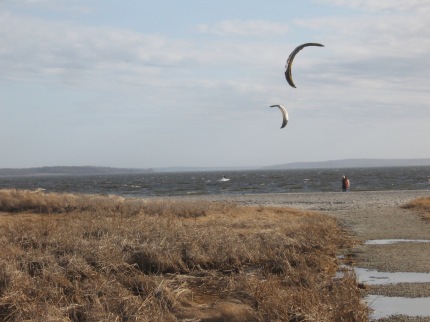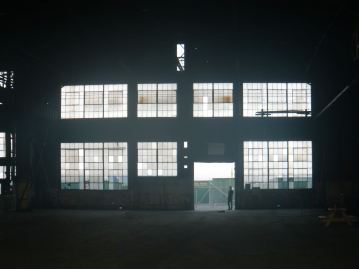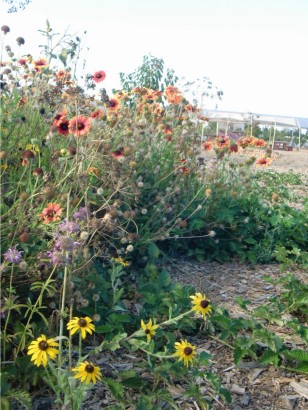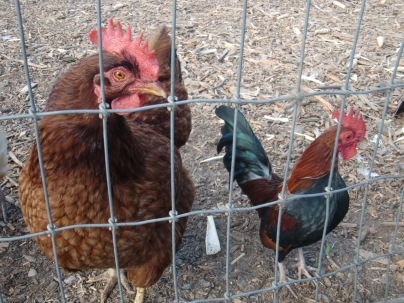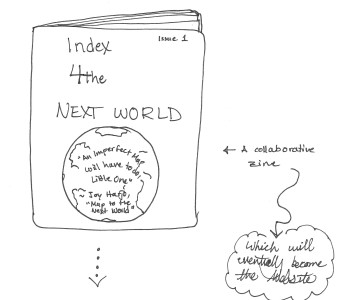Page 2 of 3
A Home for the Seeds
It was as the floods were coming in and the steam burning through the windows that we gripped our spades in our teeth and climbed into the mouth of the mountain to build secret homes for the seeds.
We did not know each other, or we thought we did not.
We had not been born in the same places. We had never spoken words the others recognized. In the flood, trying to get out of the city, we had found ourselves in a tangle of unmatched tongues and car tires spinning wretched against the finally wet, so wet, too wet soil. Cacauphony. An unwieldy din.
But there was a language we held common, a thing that drove us madly into the hills soaking and coughing, our pockets full of sunflowers and fava beans. Call it the language of fertility. The rhetoric of rot. Of reimagining. Call it insanity. Call it a failure to bite down and trudge the proper path and save the proper thing. Call it disease or dis-ease or dissonance or dismantling, all.
Whatever name, we had it. We were, first and foremost, the ones who got out, some privilege and a dash of chance. And we were also ones who knew that the story of what-to-do-in-case-of-disaster was just a made thing, a stitched thing, an invisible lawbook, something written by five-fingered-hands in one very specific language for one very specific purpose. That the disaster itself was a story too, a made thing, a written thing. And we were the ones who knew story could, just as easy, be torn up, dug up, re-stitched, by hands, by briars, by sharks’ teeth snagging. We were the imaginers. The anxious creators, for whom no law is obvious and no story a static end. We had no set idea of how precisely to respond to a flood. We were not wed to any particular conversation with G_d about the monogomous needs of animals on large boats that wait out storms. Neither were we looking to save the microwaves.
And we were the ones that had no children. Or whose children had already gone. To the waters, to the white and hungry guns, to the longing. We were the ones who had no seeds.
So we found some. In the backs of our closets, in the corner stores standing ankle-deep in water, in the jars on the tilting kitchen shelves. And we gripped our spades in our teeth, and we looked sideways as the streets began to buckle and fold into foothills, and we saw each other limping, and rolling, and running, pockets spilling over with hard-shelled children, with descendants of future trees, and we reached out as we ran, and we gripped each other’s hands in our hands.
It was the queerest thing, like a bird in love with a sturgeon, a family of defectors, arms empty of objects and pockets emptied into soil above the water line, saving no wealth or infrastructure, saving the wrong things. A re-kindling, a re-kinning, a reckoning. All this dying, it has been beyond swallowing. All those bodies, they came home to the soil. And so we gave them children. Hard-shelled and root-bound. It was a kind of making love to the dead. We slipped seeds into their pockets. Their bodies fertile, already almost soil, meeting the beans, the walnuts, the pits we plunged in to the wet ground. The rhetoric of rot. The true nature of kinship: all things becoming other things. Hidden in the mountain, learning each others’ languages, guarding, guardening, waiting for the first roots, those parts of the plants called “radical,” to unfurl their faces into the soil.
Copyright 2016 Rachel Economy
brave enough [poem]
everything is just a question of how
to be
brave enough
or
how to go on living and
leaving the house even
if
some days
you’re not
Poem- “Air”
Read this at Goddard open reading a couple weeks ago. What a place. What people and their work. A reminder about making, about putting work out there, about messiness and connection and the importance of sharing art even (especially) when I have no idea what it will mean to anyone besides me. Thanks Erin for reminding me- here it is 🙂
June 15, 2015
Air
Tonight I gave myself
the heimlech while naked, thrown
over the back of a chair (having
aspirated somehow
a tincture, magic I tried
to slip under my tongue
to make up for the long nights of
searching for self instead of sleep.) I
had just stepped out
of the shower.
Suddenly
where time for decisions
about asking for help and
the utter vulnerability of skin
was once endless, or
nearly so, I
suddenly found
only thirty seconds
between myself and
the finite convulsion of lungs
If the chair had not worked
(and as it was I had to go back twice, twice
I could not breathe the slightest)
If the chair had not worked
I would have run onto the porch naked
and hammered on the neighbors door in the moth-bitten light
of cool June, and someone
maybe
would have wrapped their arms around me
so I could have air again.
Maybe not.
The absurdity of this situation strikes me like
the absurdity of all need, how
I have wanted
for months
to slide closer to the idea
of your arms wrapped around me, how
I have therefore run
in the oppostie direction, thinking
time is endless, thinking
there will be another day, later, when
it’s safer, to
clamor onto the stark exposure of
porchsteps at night, to
splay myself, epidermis and heart showing,
begging
give me air
give me air
give me air.
“Relationship”
It’s Poem-a-Day/Post-a-Day Week! No editing, no perfectionism, no publisher/submission-managers mediating the place of art in public.
~~~~~~~~~~~~~~~~~~~~~~~~~~~~~~~~~~~~~~~~~~~~~~~~~~~~
Day 5
Old, short poem because exhausted/short poems are cool/old poems need light.
*
relationship
I think you’re wrong about almost
everything
except
the way you press me into the door.
*
(Originally printed in the “Faults” issue of Index/Fist zine, 2013)
“Quetzal” (selection)
It’s Poem-a-Day/Post-a-Day Week! No editing, no perfectionism, no publisher/submission-managers mediating the place of art in public. 
~~~~~~~~~~~~~~~~~~~~~~~~~~~~~~~~~~~~~~~~~~~~~~~~~~~~
Day 4
Selection from a very old piece called “Quetzal”- didn’t know I was going to revisit this in my laptop annals today. At a time of trying to practice letting go of the need to know with absolute certainty before naming myself/living life, reading this piece from age ~19 I feel this bittersweet relief, like: thank heaven I don’t have to believe this hard-assed self-policing sh** anymore. And: sometimes I still do.
*
~the diving bell~
Mouths to caress was back where the exile began, when her mind started to sprout feathers, leeched her colors away so it could fly them out into a forest made of rain. Mouths to caress and which shape they made. Which language touched which tongue (language laps, same word as tongue- when we kiss you are inside a diving bell, delving, coming up with bright flash sounds about me in your clumsy mesh bag. This is why it is so important for words and taste buds to be true).
[here is the part of the story that wanders untold. an archive without a gap makes a face without a mouth, no teeth or appetite]
*
~bird cornias~
And what she meant was “I have been watching the place where your hair meets your neck for weeks and I don’t know why.” What she meant was “I am in awe of your indifference.” What she meant was “I have just let go my first love and he is still crying.” What she meant was “I don’t know, I don’t know, I don’t know anything and when I see you I feel these unfamiliar wings beating at the inside of my eyes.”
*
~still tongue~
The tongue is still the same word as language. Her moral teachings are clear: you will not tell a lie about your self. You will know, and only then will you say.
“Love Note for the Rough Days”
It’s Poem-a-Day/Post-a-Day Week! No editing, no perfectionism, no publisher/submission-managers mediating the place of art in public.
~~~~~~~~~~~~~~~~~~~~~~~~~~~~~~~~~~~~~~~~~~~~~~~~~~~
Day 3
A first draft from 10 days ago, Hawk Campground, Marin Headlands, under the cypress rain
_
Love Note for the Rough Days
Rest easy
in that storm heart, those
thunderheads gave it to you for
watering roots and
shaking bones into
dancing.
Sometimes it’s dark inside the
beating water of the sky.
Rest easy
in that storm heart you got, let
relief crack open the way
summer breathes in Georgia
when something bigger
than human hands decides
there will be no more fires set, no more
fires allowed to burn.
The way lungs
fill with electric ease
when it finally finally
finally rains.
“When I Was An Octopus”
It’s Poem-a-Day/Post-a-Day Week! No editing, no perfectionism, no publisher/submission-managers mediating the place of art in public.
~~~~~~~~~~~~~~~~~~~~~~~~~~~~~~~~~~~~~~~~~~~~~~~~
Day 2- Work-in-progress, written originally last winter
When I was an octopus
There are certain colors to the action called writhe
certain cremations and correlations to the avoidance called write, certain
ways
of wrapping oneself around skull in order
to fit body through the most invisible of cracks in the
red flesh rock wall.
Once, at the aquarium
all the fish of a particular gulp size went missing
from the tank a hall over from me.
No one noticed for days
that there was a walnut shaped hole between
the stones in the wall of the sea where I
pretended to live.
Afterward, no one noticed
for another week entire
that my head would resemble a walnut
if all the writhing flesh compressed
into a point of electric orange
a fire-tipped sucking in
slipping tight limbs through
tighter holes,
yes
like that, the octopus
is rumored to be the only creature
that
like us, enjoys such things, but
unlike us
has no penchant
for setting rivers on fire.
ZINE LAUNCH! “Index for the Next World” CALL FOR SUBMISSIONS
“…[W]e are good at resisting. We are good at fighting for the world we don’t want. We are good at analysis …We are skilled at naming what we don’t want. I think we are less skilled at naming what we do want; our visions for liberation. And not just vague things like, “ending white supremacy and heterosexism,” but how are all the children going to get fed? Who will clean the toilets? Who will take out the trash? Who will cook the food?”
-Mia Mingus, Remarks from the closing plenary, “Revolutionary Organizing Across Time and Space,” at the INCITE! Color of Violence 4 Conference, March 26-29, 2015, Chicago, Illinois.
Re-storyation is a term I use to illustrate what I study/the work I do. Actually, it’s work we do, as communities and socio-ecosystems. I am humbled and made hopeful over and over by the activist work I get to learn from and about, witness, and participate in. I study the ways that really big, often invisible culturally rendered stories are taken as given and unquestionable truths, and what happens when we change and re-design not only our systems (physical and cultural), but the stories that engender and reinforce them. Today, I am so excited to invite you into the first seed stage of a collaborative re-storying project I have been slowly pondering and dreaming about for 3+ years.
Come on in, makers, wonderers, poets, cooks, activists, humans! Are you into these questions and ideas? Do you want to collaborate? Send in some things for the zine! Come to one of the community events (to be announced soon)! Tell me what excites you, or if you want to collaborate on zine-printing parties, crowdfunding campaigns, brainstorming, website building, or something else going forward.
The project is called
Index for the Next World.
Here is what it’s about:
Index for the Next World is a collaborative collection of stories, art, poems, maps and other rich, nitty-gritty visions for the next world.
Whatever stories we tell will shape the world. What shape do you imagine in a world that thrives? What do you imagine in your wildest dreams?
What would the specifics of that world we are both grieving and longing for look like if there was no “but we can’t because_________?”
The intent of this project is to collect and cultivate work/art/play that is curious or concerned about, for example, how we’re going to simultaneously meet our needs for community ritual and durable dishware (stuff to eat off of), what we’re going to do instead of policing and surveillance, how we’re going to throw dance parties and feed the children, what community justice looks like, or how we might replicate the important things about the internet, in a post-scarcity, post-petroleum, post-extractionist, post-domination, pro-abundance, pro-resilience, closed-creation-loop (i.e. no mines as sources no landfills as “final resting place”) world.
We are tired of being told that art and imagination are impractical luxuries or hobbies and not revolutionary acts. At the heart of “business as usual” live invisible stories of scarcity, separation, and domination, a long-standing status quo with a momentum and an inertia that are threatened when we come together to imagine the specifics of something different out loud.
The point here is not that ending white supremacy and heterosexism (as Mingus mentions in the quote above) aren’t important- they are essential. The point is that honoring their importance and possibility includes getting down to the specifics of what our lives and communities look and function like while and after those things are ending/ended.
Currently in its seed stages, the Index lives in the world right now as a zine and community event, and behind the scenes as an upcoming online-resource-to-be.
SUBMIT TO ISSUE 1 OF THE ZINE! Poems, maps, recipes, stories, art, photos (just know that this is currently a low-budget b&w zine), instructables, diagrams, songs, hybrid forms. Submissions should be attached to an email as either a .docx, .jpg, or .pdf file, and sent to rachel.nextworld [at] gmail.com. (Deadline for Issue 1 TBD)
CRITERIA: This project aims to be as inclusive as possible. Work should be on the shorter (zine-appropriate) side in these beginning stages. The length of the zine will be limited by the printing budget for a while.
PLEASE AVOID: “Color blind” language (‘we don’t see race in the next world’). This framework does not meet the needs of this publication for creative and respectful justice and anti-oppression work. This goes for all forms of oppression and identity. “Getting rid” of diverse identities, now or in the future does not solve oppression, it reifies it. It can lead to blaming the oppressed for their oppression, identity erasure, and failure to acknowledge the injustice and harm, and diverse offerings, gifts, and cultures, of the past and present. Also importantly, ecology teaches us that non-diverse systems are not resilient systems. Most of us do not and will not have the option (and many of us do not have the desire) to “forget” our identities, affiliations, heritages, or oppressions. Our histories and identities don’t magically disappear in the next world, so submitters please meet and weave them in your work creatively, abundantly and respectfully.
This is a call to all creators (that means you!) to imagine the next world now. We’ve been told that our visions and stories are impractical precisely because they are impactful and therefore dangerous to the entrenched status quo, but also because they are so hard for us to prioritize in the face of immediate suffering. So let’s not prioritize them over current needs- let’s care for the current needs and map our deepest, most mundane and miraculous visions of where we are going, of what our interventions seek to build in place of the old world.
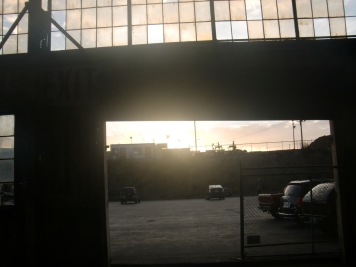
Here, we treat storying as the deeply practical work that it is.
Many cultures have carried and protected so much knowledge and story of how to live, through crises, colonialism, ecological and social violence. Many organizations and communities are modeling and prefiguring next-world practices right now, right here. This is not a request to reinvent or appropriate the wheel. This is an attempt to connect and honor an abundance of stories in one place, to honor and make visible and accessible some of the work that art and storying do in shaping the world. To create an interactive repository of stories and visions that we can refer to and build from.
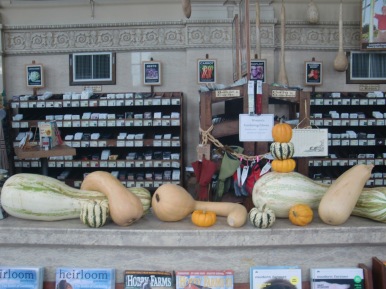
Imagine that we’re already there. And show us the rich specifics of what it looks/feels/tastes/sounds/smells like, paint us the details of how we, as communities, meet our needs and give our gifts.
Continue reading “ZINE LAUNCH! “Index for the Next World” CALL FOR SUBMISSIONS”
Prefigure Your Pleasure
“…the movement should seek to prefigure, or anticipate and model, its goals in its own work.”
– Oppose and Propose: Lessons From Movement for a New Society, pg 24
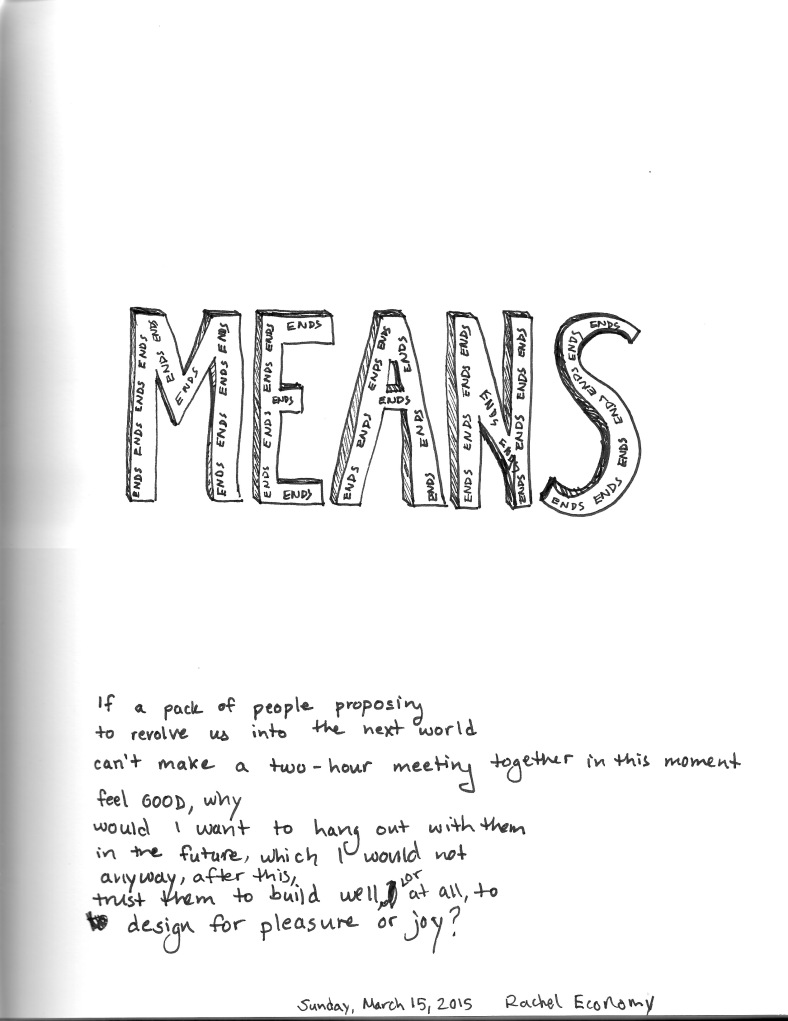
“If there’s no dancing at the revolution, I’m not coming.”
– Quote attributed to Emma Goldman, deriving from her works and words
***
“Regenerative hedonism: have so much fun that no one can resist joining in.”
– Grace’s Permaculture Wisdom, Woolman PDC 2013
***
I spend a lot of time wondering about, talking with folks about, and working towards, prefigurative spaces and practices.
My way of explaining prefiguration: spaces and practices where the how models and matches the what. Container = content. Micro and macro correspond. The means both move towards, model, and are the ends.
An example: a group that has ends of racial and gender equality and justice designs its meeting facilitation process with careful attention to who shares and how much, in order to make sure traditional patterns of conversational and decision-making dominance are subverted and replaced with an equitable balance.
Often, my interest in prefiguration comes up outside of the explicitly political arena. Actually, it comes up everywhere.
Right now, I’m doing some gentle loping into the questions “Why does this matter so fiercely to me?” and “How do I locate this in larger contexts of activism?”
The main delicious and frightening creative challenge usually on my mind and heart is:
What would we want this to look like in the next world?
and Ok, what are the barriers? What’s stopping us? How much of that can we go ahead and create right now? How do we want it to feel?
and For/with who? Are we just dropping out? How do we make sure access, collaboration and radical inclusivity are part of that creation?
In the spirit of prefiguring a world that does not demand that individual contributions be perfect performances to be worth hearing in the collective space, instead of writing a novel as is my tendency, I’m going to leave these musings here, threads on a partially woven loom. Here’s to prefiguring imperfectionism and vulnerability, here’s to prefiguring an invitation in to a conversation with many voices, rather than just presenting a closed script (I tell myself as my hand hovers over the little trashcan that would delete this post…)
How do you experience prefigurative practices and spaces, not just in explicit political movement building, but also at your work, in your home, in your relationships? Is this important to you? Why?
I’ll leave with an old poem I wrote after seeing the Beehive Design Collective present their project “Plan Colombia” in 2008 or 2009, during which they spoke about their interviewees description of the essential and necessary power in singing and celebration-to generate strength, resilience, co-care, and solidarity in a community of workers under attack.
How might this beloved community, this necessary play, allow us not only to model the joy of world we want to live, in the face of all that works against that next world, but also lend us the strength and support of interconnection, the sharp pleasure so that we can keep on facing and working in the current world with our eyes open to its pain, a pain that an individual person sometimes cannot hold alone?
“If there is no dancing”
If there is no dancing
the revolution will not come.
If there is no dancing
the sunflowers will curl in
on their heavy heads too early,
stars bound straight to red death
no chance to feed the curious mouths
of children or birds.
If there is no dancing
your ears cannot hear my
tongue-song drumming
I will never know
what sound your body makes.
If there is no dancing
the revolution will stay too long
calling itself progress and
turning pale
a death un-coming
un-feeding
un-found.
If there is no dancing
our hammer-hearts
cannot feel the nail.
Once,
the hive-minded painters
walked out of the coca fields
and into the local bar
to ask why everyone was singing
the people looked over their glasses
over swaying heads
and said:
song is the only choice
when the soil voice gets hit
with helicopter fire.
what do you do when everything
is coming up orange?
how else will you un-lid your eyes
and not turn and run?
Alone,
I open up landscapes of the possible
behind my eyes, like
we could walk speakers into
the parking deck and mad
dance stamp until
the rains redistribute the water
or until
we are declared a wild nuisance
or until
the mud-slung hateful shape of things
grows us another hammer and
another hand to hold it and
we write songs that say
what will be built out of
houses, coastlines
reef-depths that now stand broken.
We could kiss like the abandoned
so that nobody would be.
We could write those songs on the bark of a tree
without touching it.
We could overlap and balance
invisible wings wrapped
twisting to vestigial beats.
We could reopen the sunflowers
petal by bright sky petal
until they too dip their heads
into music and move
until they too can turn faces
towards the horrors and hurts.
Without dancing
we will never remember
how to spin the rusting wheel.
***********************************************************************************
If you want to read more about prefigurative politics in movement building, check out the Berkeley Journal of Sociology’s forum on Power and Prefiguration, and the book Oppose and Propose: Lessons From Movement for a New Society, over at Anarchist Press.


